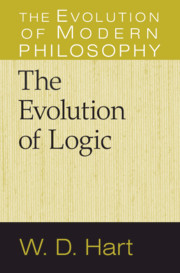Eight - The Critique of Pure Reason
Published online by Cambridge University Press: 05 June 2012
Summary
In Chapter 5 we looked at a theory about natural numbers. Since all recursive relations are n.e. in Q, and the consistency of Q is provable in elementary number theory, we concluded that Q is undecidable. But Q has only finitely many axioms specific to natural numbers, so there is a conjunction A of these axioms. So if we let P be the logic fixed by the language of Q, then a sentence B of that language is a theorem of Q if and only if A → B is a law of logic according to P. By the completeness theorem for first-order logic we mentioned in Chapter 4, being a law of logic according to P may be read equivalently either as being deducible from logical axioms of P by logical rules of inference of P or as being true in all interpretations of the language of P (which is that of Q). So if being a law of logic according to P were decidable, we could apply an algorithm for it to A → B to decide whether B is a theorem of Q, so Q would be decidable. Hence being a law of logic according to P is undecidable.
Suppose, conversely, there were an algorithm α for being a theorem of Q. The property FΣ of being a proof in Q in which only logical axioms and rules of P are used is a decidable property; just look at the proof to see which axioms and rules are used. So its gödelization FA is recursive, as is the predicate LA(x, y), which holds if and only if x is the gödel number of a proof in Q whose last line is the formula with gödel number y. Let B be any sentence in the language of Q and let b be its gödel number. Then B is a law of logic according to P if and only if (∃x)(F(x) ∧ L(x, b)) is a theorem of Q (where F and L n.e. FA and LA), so by applying α to the second we could effectively decide whether B is a law of logic according to P.
- Type
- Chapter
- Information
- The Evolution of Logic , pp. 205 - 234Publisher: Cambridge University PressPrint publication year: 2010



